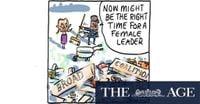In the wake of the recent federal election, significant changes are unfolding within Australia's political landscape, particularly for the Liberal Party. Following a resounding defeat on May 3, 2025, former Opposition Leader Peter Dutton has officially exited the political arena after nearly 24 years in Canberra. Despite his departure, Dutton is not leaving empty-handed. Thanks to a now-repealed parliamentary pension scheme, he will receive an estimated annual pension of $258,000 for the rest of his life. This figure is derived from a percentage of his pay while serving as Opposition Leader, which was $432,280 during his tenure. Even in retirement, Dutton's income will surpass that of sitting backbenchers, who earn $233,660 annually, effectively allowing him to earn the equivalent of two-and-a-half average Australian salaries without any further work.
Dutton's pension, however, is not the only topic of discussion. The Coalition's future hangs in the balance as cracks begin to appear in its nuclear energy policy, which many perceive as an attempt to delay a transition to alternative energy sources. Prominent voices within the Coalition, including David Littleproud and Bridget McKenzie, remain committed to nuclear energy, but public opinion is shifting. Critics argue that the party's alignment with the National Party, which has increasingly become a mouthpiece for right-wing interests in the mining and corporate farming sectors, is contributing to its decline. The perception of the Liberals as beholden to the Nationals has alienated many voters, particularly women and urban constituents, who are increasingly concerned about climate action and social issues.
As Dutton steps away, only six sitting MPs and senators retain access to the more generous pension entitlements from before the 2004 reforms implemented by former Prime Minister John Howard. This change, initially aimed at aligning politicians' benefits with those of average Australians, has sparked ongoing debates about the fairness of post-parliamentary compensation. Taxpayers currently support over 400 retired politicians and their spouses under the now-defunct pension scheme, costing approximately $50 million annually. The last pension payouts are not expected to cease until 2063, raising questions about the sustainability of such expenses.
In the wake of the election, the Liberal Party faces a critical juncture. Christopher Pyne, a former member of the party, has suggested that the Coalition needs to take three essential steps to regain public trust: develop a coherent climate change policy, abandon divisive culture wars, and introduce quotas for women in parliament and cabinet. The party's recent history shows a stark gender disparity; in the 2022 election, every seat lost was to a female candidate, many of whom championed climate action. Yet, only 32 percent of the Liberal Party's candidates in 2025 were women, highlighting a significant gap in representation and responsiveness to contemporary societal needs.
The need for a renewed focus on climate policy is underscored by the Coalition's reliance on a nuclear energy proposal that has been widely criticized as unrealistic and costly. As the electorate increasingly demands action on climate change, the party's failure to adapt may further alienate voters. Critics argue that the Coalition's commitment to nuclear energy serves primarily to placate climate deniers within its ranks while delaying necessary transitions to renewable energy sources.
Moreover, the electoral landscape is shifting dramatically. The recent election results signal a growing frustration among voters, particularly in urban areas, where the Liberal Party's ties to the Nationals have been perceived as detrimental. Voters are calling for a return to core Liberal values that prioritize individual and corporate rights and freedoms. The party's current trajectory, characterized by a focus on divisive politics and a lack of coherent policy direction, may lead to further losses in upcoming elections.
As the Liberal Party grapples with its identity and future, the need for introspection and strategic recalibration is evident. The party's leadership must recognize the importance of addressing climate change and social issues in a manner that resonates with a diverse electorate. The recent election serves as a wake-up call, highlighting the necessity for the Liberal Party to reconnect with its constituents and redefine its vision for Australia.
In addition to the political upheaval, the recent elections have also revealed systemic issues within the voting process itself. A significant percentage of informal votes, which can result from confusion over preferential voting systems, has raised concerns about voter engagement and representation. In some electorates, informal votes reached alarming levels, with nearly 10,000 ballots rendered invalid due to complex voting requirements. Calls for reform to simplify the voting process are growing, as many believe that an optional preferential system could better reflect the political choices of the electorate.
Meanwhile, in the realm of the arts, a young artist named Matilda Emmerich has sparked controversy with her painting, "Where Hope Sits," which was rejected from a local agricultural show. The artwork, weighing 4.5 kilograms and measuring 57cm x 76cm, depicts the desecration of flags and has been interpreted as a powerful commentary on the state of the world today. Critics argue that such works should be celebrated and displayed in prominent galleries rather than censored, as they provide valuable insights into contemporary issues.
As the Liberal Party faces mounting challenges, it must consider the broader implications of its policies and the voices of its constituents. The electorate is calling for a more inclusive, responsive, and forward-thinking approach to governance that prioritizes climate action, social equity, and genuine representation. The path forward will require courage and commitment to address the pressing issues of our time, ensuring that no voices are left unheard.





